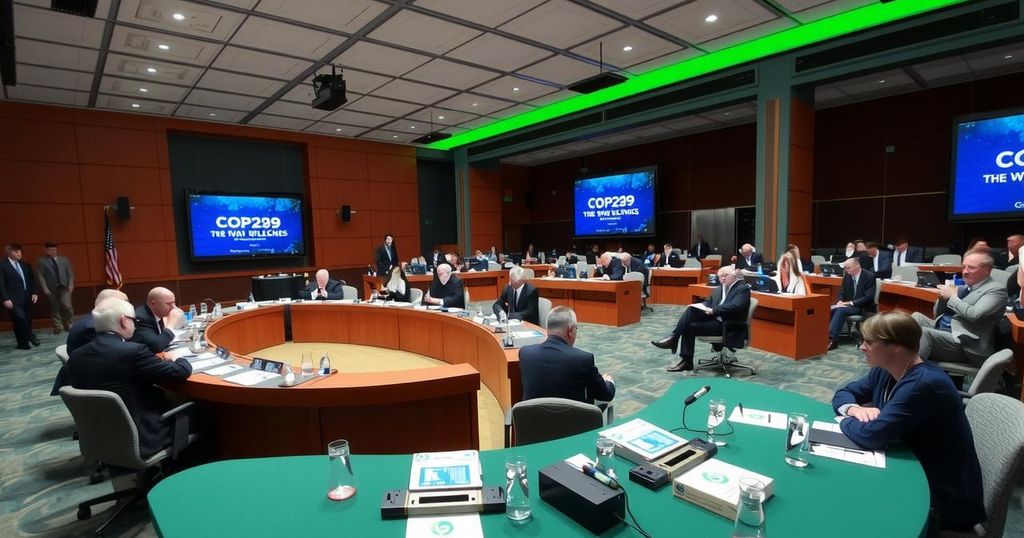COP29 witnessed the formation of a coalition of over 30 nations committed to accelerating climate action amid rising global greenhouse gas emissions and alarming temperature records. The coalition aims to adopt stringent measures to achieve net-zero emissions, with insights from the Rhodium Group indicating the potential to limit warming to 1.4 degrees Celsius by 2100 with concerted efforts. Key players like the UK, Brazil, and the UAE are leading these new commitments as the scientific community warns of the urgencies posed by climate change.
The 29th Conference of the Parties (COP29) to the United Nations Framework Convention on Climate Change, held in Azerbaijan, has garnered attention due to a newly formed coalition of over 30 countries committed to more aggressive climate action. This initiative comes amid an ongoing rise in global greenhouse gas emissions and alarming temperature increases, underscoring the urgency for effective action. Prominent countries, including the United Kingdom, Brazil, and the United Arab Emirates, have pledged to adopt stronger measures aimed at achieving net-zero emissions, presenting a beacon of hope amidst prevailing pessimism regarding climate goals.
Notably, the coalition is responsible for approximately a third of global GDP, emphasizing its potential impact on collective climate action. Their commitments are bolstered by insights from the Rhodium Group’s report, which suggests that with substantial reductions in emissions, it is feasible to limit global warming to 1.8 degrees Celsius by the end of the century, provided that existing 2030 targets are met and enhanced thereafter. Moreover, if additional emissions from non-net-zero countries are curtailed by 2070, the world could potentially stabilize temperatures at 1.4 degrees Celsius.
Recent warnings from scientists indicate that the world is perilously close to triggering irreversible climate tipping points at temperatures above 1.5 degrees Celsius, emphasizing the critical nature of the coalition’s commitments. The discourse captured at COP29 indicates a recognition of these dangers, with emphasis placed on tackling methane emissions, which, if reduced significantly, could halve the rate of global warming. Barbados Prime Minister Mia Mottley’s assertion regarding the necessity of a global methane reduction agreement highlights the need for collaborative approaches moving forward.
As nations approach COP30, scheduled to be hosted by Brazil, the necessity for upgraded targets accentuates the significance of these commitments. With methane levels reaching alarming heights, the focus on reducing such emissions, alongside carbon dioxide, emerges as a collaborative strategy essential for stabilizing the climate. The insights from this coalition and their developmental trajectory constitute pivotal moments in the ongoing global climate efforts, suggesting a flicker of hope in a landscape filled with daunting challenges.
The article discusses the outcomes of the 29th Conference of the Parties (COP29) in Azerbaijan, particularly focusing on a new coalition that aims to implement more decisive climate action among key global economies. With the world facing unprecedented climate threats and surpassing critical temperature thresholds, this coalition reflects a vital shift toward fulfilling international climate pledges. The context emphasizes a growing urgency to meet increasingly ambitious emission reduction targets to avert catastrophic climate change effects.
The formation of a coalition of over 30 nations at COP29 represents a significant step toward enhanced climate action, emphasizing the necessity of meeting and surpassing emission reduction goals. With scientific insights underscoring the risks of exceeding 1.5 degrees Celsius, the coalition’s commitment to aggressive targets might offer a viable path to preserve global climatic stability. The focus on reducing methane emissions is crucial, and the upcoming COP30 will be pivotal in translating commitments into actionable goals.
Original Source: www.bostonglobe.com






